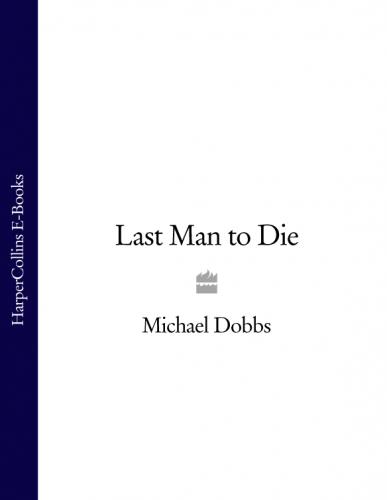MICHAEL DOBBS
Last Man to Die
To the Memory of my Father.And all those who came before
CONTENTS
It was a filthy way to die, he told himself.
He had imagined death would be something rather grand. A few immortal last words that friends would discuss and applaud as they chewed over his life and his incalculable contributions to the public weal. A dignified passing wrapped in the warm blanket of public approbation before he slipped off to an altogether more elevated plane. He had imagined it as some sort of classic English triumph, all stiff upper lip and tear-stained lace; not like this.
When the doctors told him that, at his age, there was little more they could do, he had thanked them, smiling to show that it was just another challenge. After all, it was going to be their loss rather than his. ‘Can’t complain. Had a good innings,’ he reassured them, comforting himself with the image of a final walk back to the pavilion accompanied by the applause of the crowd and congratulatory obituaries in The Times and the Telegraph. There would even be a thanksgiving service at St Martin-in-the-Fields, he hoped. Not that either of his two former wives would attend; they preferred to forget rather than forgive. And there were no children. Pity, really.
Only now had he begun to have twinges of regret, to feel the need for support as disease gnawed at his bones and his self-esteem. He had returned to his old haunts, the scenes of previous battles and many victories, wanting to touch them one more time. The first stop had been at his ancient public school perched on the Sussex Downs where his intellectual agility had begun to develop a true cutting edge and his singular competitiveness had marked him out as a boy who would go far. But he recognized no one; only the young headmaster had shown any interest and that had faded with the realization that there was to be no endowment cheque in exchange for the tea and wholemeal biscuits. He hadn’t bothered going back to his Oxford college; nowadays the old university sanctuaries all seemed to be given over to women and he hated that. Women had never been more than a distraction for him, rarely pleasurable, inevitably expensive and, ultimately, always irritating.
So he had come to London, an uncommon event since his retirement some years before. Even that had changed. The noise and crush disorientated him, the traffic ground impatiently to a halt while the people, more impatient still, hurried past, unaware and unconcerned. Whitehall, which had been the playing field for much of his career, hid distant and austere behind the new security and surveillance systems. Downing Street was where during the war he had lived, slept, loved and, in the days of defeat and despair, had even thought he might die. Now he couldn’t even get close. He had stood wedged behind the barriers, staring forlornly through the wrought-iron railings. No more crisp salutes from the duty policeman, no more satchels full of papers marked ‘Top Secret’ and smeared with the dust from Churchill’s cigars, only barriers with hidden cameras and windows covered by heavy bomb-resistant curtains to catch the shards of glass, just in case.
It was another world, a world rushing by, a world of which he was no longer part. On those streets he used to know so well he had become mesmerised and confused by the bustle while in every shady corner where he sought refuge he felt as if he were standing on the doorstep of a still darker world. He had discovered he was shaking.
He had sought refuge in the all-male preserve of his club. Here at least all was familiar order, nothing appeared to have changed. He had sat in his favourite armchair at the Athenaeum for the entire afternoon before realizing that his friends were no longer there and the few acquaintances who recognized him had no time for a decomposing old man with no future. Someone he thought he knew had approached purposefully from the other side of the room, but solely to ask whether he had finished with the newspaper. Only the steward in the coffee room seemed happy to speak with him, and he didn’t have English as a first or even third language.
He had sat, a frail figure dwarfed in an armchair of ancient, cracked leather, knowing this world had already passed him by, and whether he was yet willing to let go or not was of little consequence. He no longer belonged. He was an anachronism, of less importance to his fellow man than the battered armchair he occupied or the newspaper he was reading. He was an old man watching his body slowly being eaten away, feeling the strength drain from him a little every day and discovering that dying
